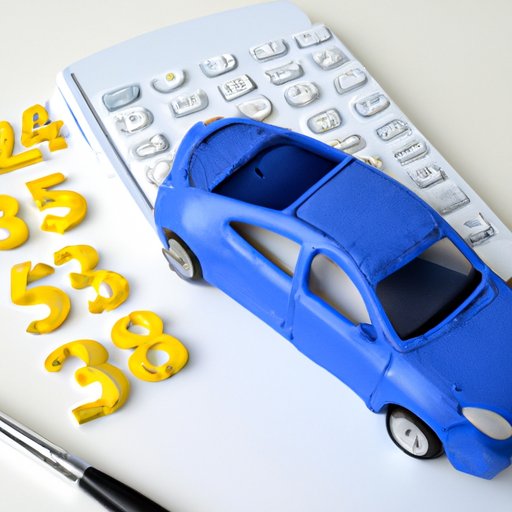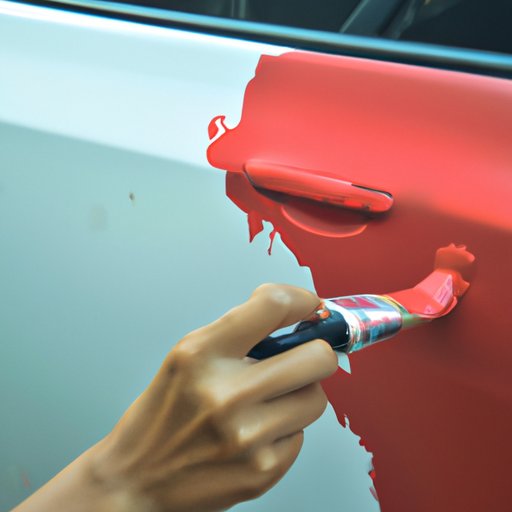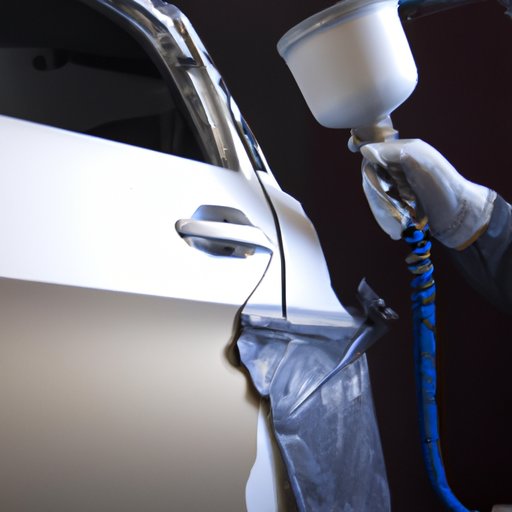Introduction
Whether you’re trying to spruce up your ride or just looking to make a change, painting your car is a big decision. Not only is it a time-consuming process, but it can also be expensive. Before taking the plunge, it’s important to understand the cost of painting a car and the different factors that determine the price. This article will explore the average cost of a professional paint job for a car, how to estimate the cost, tips to reduce the cost, and the pros and cons of doing it yourself vs hiring a professional.
The Average Cost of a Professional Paint Job for a Car
According to a survey by Consumer Reports, the average cost of a professional paint job for a car is between $1,000 and $4,000. The exact amount varies based on a variety of factors, including the type of paint used, the size of the vehicle, and the number of coats applied. It’s important to understand these factors before getting a quote from a professional.
What Factors Determine the Cost?
When it comes to painting a car, there are many factors that determine the cost. The type of paint used is one of the most important factors. There are two main types of paint: acrylic enamel and urethane. Acrylic enamel is cheaper but doesn’t last as long as urethane. Urethane is more expensive but offers better protection against fading and chipping. Another factor is the size of the vehicle. Larger cars require more paint, which increases the cost. The number of coats applied is also a factor. A single-coat paint job is cheaper than a multi-coat job.
What are the Price Ranges?
The cost of a professional paint job can vary greatly depending on the factors mentioned above. According to data from Angie’s List, the national average for a basic paint job ranges from $300 to $900, while a more detailed paint job can cost anywhere from $1,500 to $3,500. Custom paint jobs can cost even more, ranging from $2,500 to $5,000 or more.

How to Calculate the Cost of Painting a Car
If you’re considering painting your car yourself, it’s important to have an accurate estimate of the cost. To do this, you’ll need to consider several factors, such as the cost of materials, labor, and any additional services you may need.
Factors to Consider
Before you start calculating the cost, it’s important to consider all of the factors that could affect the cost. These include the type of paint, the size of the vehicle, the number of coats applied, and the cost of any additional services, such as sanding or buffing.
Estimating Labor Costs
The next step is to estimate the labor costs. If you’re painting the car yourself, you won’t have to worry about labor costs. However, if you’re hiring a professional, you’ll want to get an estimate of how much they charge per hour. Most professional painters charge between $50 and $100 per hour.
Estimating Material Costs
Finally, you’ll need to estimate the cost of materials. This includes the cost of paint, primer, clear coat, sandpaper, masking tape, and any other supplies you may need. The cost of materials will depend on the type of paint you use and the size of the vehicle. Generally speaking, materials for a small car can cost anywhere from $200 to $400, while materials for a large car can cost up to $800 or more.

Tips to Reduce the Cost of Painting Your Car
If you’re looking to save money on a paint job, there are a few things you can do. First, choose a cheaper color. Basic colors like black or white are typically less expensive than metallic or pearlescent colors. Second, shop around for quotes. Get estimates from multiple professionals to find the best deal. Finally, opt for a partial paint job. If you’re only looking to touch up a few areas, a partial paint job can be significantly cheaper than a full paint job.
DIY vs Professional: What’s the Cost Difference?
One of the biggest questions people have when it comes to painting a car is whether to do it themselves or hire a professional. Both options have their pros and cons, and the cost difference can vary greatly depending on the factors mentioned above.
Pros and Cons of Doing it Yourself
Doing it yourself is usually the more cost-effective option. You don’t have to pay for labor costs, and you can buy materials in bulk to save money. However, it takes a lot of time and patience, and it’s easy to make mistakes that can be costly to fix. Plus, you may not get the same quality of finish as a professional.
Pros and Cons of Hiring a Professional
Hiring a professional is often more expensive but can save you time and hassle. Professionals have experience and expertise that can help ensure a high-quality finish. However, they may charge extra for additional services, such as sanding and buffing, which can add to the cost.

The Benefits and Drawbacks of Painting Your Own Car
Painting your own car can be a rewarding experience, but it’s important to weigh the pros and cons before deciding. On the plus side, you can save money and have complete control over the process. On the downside, it can take a lot of time and effort, and you may end up with less than perfect results.
Pros & Cons of Custom Paint Jobs on Cars
Customizing your car with a unique paint job can be a great way to express your personality and make your car stand out. But there are some drawbacks to consider as well. Custom paint jobs are typically more expensive than standard paint jobs, and they may not hold up as well over time.
Conclusion
Painting a car can be an expensive endeavor, but understanding the cost and the different factors that influence it can help you make an informed decision. Whether you decide to do it yourself or hire a professional, knowing the cost of painting a car can help you budget accordingly.
(Note: Is this article not meeting your expectations? Do you have knowledge or insights to share? Unlock new opportunities and expand your reach by joining our authors team. Click Registration to join us and share your expertise with our readers.)
